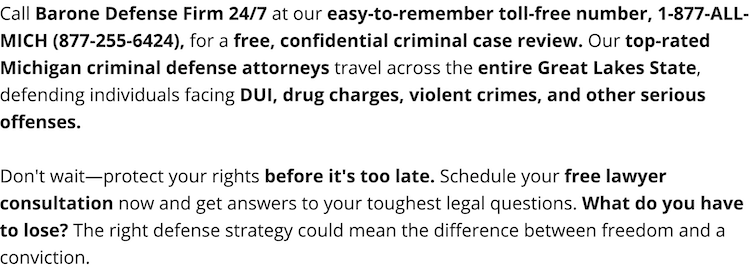Drug Possession with Intent to Deliver
Initially, those in charge of determining the determining the difference between possession and possession with intent would be the police, but ultimately it is the prosecutor within the jurisdiction in which the crime is alleged to have occurred, to charge the defendant. If the police have any indication that there has been intent deliver, then the person will most definitely be charged with it.
The intent to deliver affects a drug possession charge in Michigan by offering the prosecutor the opportunity to add additional charges and increases the potential penalty. The potential penalties for possession with intent to deliver are usually significantly greater than simple possession. However, this depends on the degree or the significance of the criminal enterprise and underlying criminal enterprise. Generally, the larger the operation, the larger the penalties.
In order to avoid these charges and potential penalties, reach out to a Michigan drug possession with intent to deliver lawyer as soon as you can. An experienced drug defense attorney can help advocate on your behalf and ensure you know what to expect at each step of the legal process.
Burden of Proof
Drug possession charges require proof that the person charged exercised control or had the right to exercise control over the substance in question, such as if they had the controlled substance on their person. Additionally, the prosecution would need to prove that the defendant was aware that the illegal substance was present and that it was illegal.
Possession with intent to deliver requires all of the elements of proof of a possession charge and more. The prosecutor must also show that the person delivered or intended to deliver the drug to another person. This element can be broadly interpreted. For example, a mother can be charged with delivery of a controlled substance to her child, while still pregnant.
If the person is a licensed health care professional, then the law precludes them from dispensing, prescribing, or otherwise administering a controlled substance for anything other than a legitimate medical use. Otherwise, they could be found guilty for either the possession or even the delivery of the drug.
Delivery includes both the knowledge that the substance is illegal and the intent to transfer the possession of it to another person. Usually, that determination is made based on what is commonly referred to as circumstantial evidence unless there has been an admission, a large quantity of drugs, or they have other what is referred to as "indicia" of drug dealing. Indicia of drug dealing include things like scales, ledgers, large amounts of cash, and multiple cell phones. Finally, it can be proved by an actual delivery, that is, when the drugs are sold, for example to an undercover police officer.
Testimony
Police who are undercover agents and claim to be familiar with the types of devices and language used by drug traffickers will testify about their expertise in court as expert witnesses and will very often be believed in by judges and juries simply because they are police officers. Because law enforcement is so often implicitly trusted, it is vital to have a Michigan drug possession with intent to deliver lawyer to begin building a robust defense.
Constructive Possession
A constructive possession is a term that is used in Michigan when a person does not have the drug on their person but who otherwise meets the legal definition of possession. In Michigan, proof of possession requires that the person either had the drug on their person or that it was within their ability to exercise control and that they have good knowledge of it being present and knowledge that it is illegal.
There are no diversional alternative sentencing available for first-time possession with intent to deliver charges. These are only available for possession, not intent to deliver.
Importance of Having an Attorney
Possession with intent to deliver defense attorneys in Michigan can very often have a significant impact on the type of charge that is initially brought or the type of crime that is eventually available for plea negotiations. A lawyer can have a significant impact in plea bargaining and therefore the ultimate conviction. A good lawyer can effectively debate the factors of sentencing that are favorable to the accused and that can result in a much less severe penalty.
 Barone Defense Firm Home
Barone Defense Firm Home
















